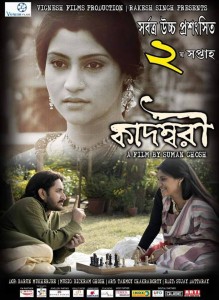 You can listen to the soundtrack here.
You can listen to the soundtrack here.
The lead performer in Kadambari’s largely instrumental soundtrack is sarod exponent Ustad Amjad Ali Khan playing in as many as six songs – one of the many aspects that make this album a delight to listen to. Composer Bickram Ghosh keeps the orchestration to a minimal level in each of these tracks letting the maestro take the centre stage. The track where that presence is most joyful to me is in Tagore’s legendary Ekla Cholo Re – ustad improvising around the poet’s original tune with the movie’s composer Bickram Ghosh on tabla. The same combination presents the movie’s lovely title track (not often that a title track is an instrumental), this time with Ghosh’s own composition – a tune that starts on something like raag tilak kamod and seems to move to durga as it progresses. The sarod maestro goes solo with Urmila’s Death, an unsurprisingly brooding piece (hints of bhatiyar?) that has more situational quality than as an audio piece. Kadambari in Thakurbari kind of comes off as a logical extension to the title track, albeit in a different raga. Khan is once again joined again by Ghosh on tabla in a nice little tete-a-tete. Seemingly reflective of their relationship, the track titled Kadambari and Jyotirindranath has a dark tone to it, Amjad Ali Khan playing a melancholic piece (possibly purvi) whose only problem is that it is just 48 seconds long. Khan’s final track is another Rabindra Sangeet, Kon Khela Je Khelbo Kokhon. The arrangement is kept simple and folksy, just Prasenjit Sil on the khol accompanying ustad, and the combination works wonderfully.
Among the other instrumental pieces, Childhood is the most appealing one for its length (most of the others are less than one minute long) and the way it is structured – a passing-the-buck of sorts between flute (Soumyajyoti Ghosh), sitar (Abhishek Mallik) and esraj (Debashish Haldar), each building around a central refrain (raag pilu would be my guess). Kadambari theme is Debashish Haldar playing an incredibly short melody with Sandeepan Ganguly’s string section for support. Too short to stick. Rabindranath and Kadambari features Kushal Das on his surbahar, conveying a sense of longing through his quick rendition. Ghosh goes for a Western touch in Rabindranath Goes Abroad, getting Vachagan Tadevosyan to lead with his oboe. Purbi and Behag on the Bajra, as it says, has violinist Sandeepan Ganguly playing the two raags quite beautifully; the shift from the dark purvi to a more positive behag is handled very nicely. Really wish this track were longer! Delhi-based Dutch cellist Saskia Rao De Haas plays in Rabindranath’s Loss of his Muse. Strictly situational piece with a Western inclination that conveys the mood quite effectively but doesn’t add much value as a standalone piece. The Final Journey is more impactful that way, has a very menacing tone to it – Kushal Das’s surbahar, Soumyajyoti Ghosh’s flute and Saskia’s cello very effectively contributing to that sinisterness.
And that brings us to the tracks involving vocals. Two of those tracks are basically monologues from the lead actors (both of which @Calvinator_18 graciously explained to me since I don’t understand much Bengali) rendered over a minimal instrumental backdrop. Kadambari’s Letter has Konkona Sen comparing life to a game of chess in Kadambari Devi’s letter to Tagore. The other one, Bhogno Hridoy (The Broken Heart) has both Konkona Sen and Parambrata Chatterjee (who plays Tagore in the movie) apparently voicing excerpts from Tagore’s book of the same title – Kadambari talking of her decision to stand by her husband, and Tagore describing Kadambari’s beauty. Saskia Rao de Haas’ cello and Sandipan Ganguly’s violin produce a doleful harmony in the background. Ghosh presents Tagore’s composition of 14th century poet Vidyapati’s lines in E Bhara Badara (desh raag perhaps) and Ustad Rashid Khan rules over the song as he usually does. The most beautiful vocal track though, goes to Kaushiki Chakraborty. One of the few tracks in the movie to carry a filmy feel, Aj Notun Probhat captures that old worldly charm fabulously in its melody, and the arrangement deftly combines classical and folk elements. And what a lovely rendition by Kaushiki; the delicate treatment of some of those nuances is alone worth looping! The lady gets a second song too, Ay Tobe Shohochori – a cute song that carries a rhyme-like cadence about it, and the singing once again is fab. Loved the use of dotara (Sujan Biswas) in this one. Kacher Shure has Rabindra Sangeet exponent Sraboni Sen reciting Supratim Sarkar’s lines. Not particularly engaging for someone who does not understand the lines. Babul Supriyo is behind the mic for the final track, Tomare Koriyachi, a song written and composed by Tagore. The tune hence has that yesteryear feel about it. Bickram Ghosh keeps the arrangement minimal – just Pulak Sarkar’s piano and Sandipan Ganguly’s violin. Nice listen, this.
A delectable mix of classical and folk music in a yesteryear setting, and a set of exceptionally talented musicians. And of course Rabindranath Tagore. Bickram Ghosh’s work in Kadambari is his best yet!
Music Aloud Rating: 9/10
Top Recos: Too many to list so just listen to the whole thing!
Full artist credits:
Original Music : Bickram Ghosh
Lyrics: Vidyapati, Rabindranath Tagore New Song Lyrics: Sugato Guha, Supratim Sarkar
Back :
All original music composed by Bickram Ghosh Music Assistant and arrangement :
Pulak Sarkar
1)Kadambari Title music Ustad Amjad Ali Khan – sarod Bickram Ghosh -Tabla
2)E Bhara Badara Lyrics : Vidyapati Melodic composition : Rabindranath Tagore
Ustad Rashid Khan- vocals Bickram Ghosh -Pakhawaj Tabla Pandit Kushal Das- Surbahar Sarangi – Debashish Haldar Pulak Sarkar – keys
3) Aj Notun Probhat Melodic Composition :Bickram Ghosh Kaushiki Chakraborty vocals Bickram Ghosh Tabla, Kanjeera, khol Abhishek Mallik – Sitar Debashish Haldar – Esraj Pulak sarkar – keyboard programming Kunal Das- Additional keyboard programming
4) Kacher Shure
Melodic Composition :Bickram Ghosh Sraboni Sen vocals Pulak Sarkar – keypads Lyrics: Supratim Sarkar
5) Tomare Koriyachi Lyrics and melodic composition : Rabindranath Tagore
Babul Supriyo – vocals Pulak Sarkar – Piano Sandipan Ganguly- violin
6) Ay tobe Shohochori
Lyrics and melodic composition : Rabindranath Tagore
Kaushiki Chakraborty – vocals Bickram Ghosh – Kanjeera Pulak Sarkar- Piano Abhishek Mallik- sitar Sujan Biswas- Dotara
7) Kadambari theme Esraj – Debashish Haldar Strings- Sandipan Ganguly Additional Strings Programming- Pulak Sarkar
8)Childhood
Pulak Sarkar- Harmonium, strings programming Soumyajyoti Ghosh – Flute Abhishek Mallik – sitar Sandipan Ganguly – Violin Debashish Haldar- Esraj
9)Urmila’s death Ustad Amjad Ali Khan
10)Kadambari in Thakurbari Ustad Amjad Ali Khan Bickram Ghosh – Tabla
11) Rabindranath and Kadambari Kushal Das – Surbahar
12)Rabindranath goes abroad
Vachegan Tadevosyan : Oboe Debashish Haldar – Esraj Pulak Sarkar -Strings programming
13)Purabi and behag on the bajra Sandipan Ganguly- violin
14) Kadambari and Jyotirindranath Ustad Amjad Ali Khan – Sarod Bickram Ghosh – Pakhawaj Tabla
15)Rabindranath’s loss of his muse Saskia Rao de haas – cello Sandipan Ganguly – violin Pulak Sarkar – keyboard Programming
16) The Broken Heart( Bhogno Hridoy)
Dialogues: Koknkona Sen Sharma, Parambrata Chattopadhyay
Saskia Rao de haas – cello Sandipan Ganguly – violin
17) The Final Journey Pandit Kushal Das – Surbahar Saskia Rao de haas – cello Violin and viola – Sandipan Ganguly Flute- Soumyajyoti Ghosh
Bonus Tracks:
18) Kon khela Ustad Amjad Ali Khan- Sarod Prasenjit Sil – Khol
19) Ekla cholo re
Ustad Amjad Ali Khan- Sarod Bickram Ghosh – Tabla
20) Kadambari ‘s Letter Koknkona Sen Sharma
Recording, Mixing & Mastering by Shamik Guharoy at Bickram Ghosh Studios Kolkata
Recording of Ustad Amjad Ali Khan at The Music Room Studio , Kolkata by Rupak Banik
Recording of Saskia de haas at RBQ sound studios , New Delhi by Sumit Babbar.



